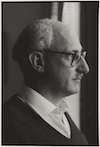David Malouf's paternal family came to Australia in the 1880s from Lebanon. His mother's family, Sephardic Jews from Spain who had gone to England via Holland, migrated to Australia in 1913 after suffering financial difficulties. Malouf was born at 'Yasmar', a private hospital in South Brisbane, the suburb where his childhood home at 12 Edmondstone Street was located. He has written about that home and other places of significance in 12 Edmondstone Street (1985). Scarborough, north of Brisbane, was a favourite place of childhood. His earliest writing was for a neighbourhood newspaper when he was about seven.
After he read Kenneth Slessor, at sixteen, Malouf realised poetry could be about Australia - and about consciousness, rather than telling a story - and he started to write poetry seriously. Slessor's poem 'South Country' Malouf regards as being a crucial turning point in the history of Australian poetry and as being one that became crucial to him too. Malouf has said that Wallace Stevens is the poet who influenced him the most and remained a favourite. One of Malouf's friends, Judith Green (later Rodriguez), sent some of his early manuscript poems to Clem Christesen and one of them, published in Meanjin, was Malouf's first published verse. Malouf was educated at Brisbane Grammar School and The University of Queensland where he taught after completing a degree. At 24, he left Australia and remained abroad for almost ten years, teaching in England and travelling in Europe. During this period abroad, he contributed columns on art, drama, and teaching to Australian newspapers.
In 1968, he returned to Australia and was appointed senior tutor and, later, lecturer at the University of Sydney.
In 'A Writing Life: The 2000 Neustadt Lecture', Malouf said,
A good many of my novels deal with verifiable moments in Australian history, not with known events but with that underside of events which is where most of us experience them, and in many cases go on experiencing them as pain or loss. I would want to call this an interior history, and what interests me is that in the ordinary way of things, so much of this, in Australia, goes unexpressed: unwritten about but also unspoken...
For him, Patrick White was a very enabling writer because he made important a writing from inside and a writing about what happens in people's heads, rather than action. The Oxford Companion to Australian Literature asserts that there are key themes that recur throughout Malouf's diverse body of work: 'the relationships between past and present, continuity and change, animal and human, and the role of language as a mediator of experience'.
Malouf learnt to play the piano and the violin in his youth. Music has always been very important to him because 'it represents another language and another mode of apprehension of what reality might be and of what feelings might be. It is close to what you're trying to make, it seems to me, in writing a poem or a novel.' (Bulletin interview 2004).
Since becoming a full-time writer, Malouf has also lived in Italy. While living in Sydney, he formed a close friendship with Bruce Beaver and assisted with his full-time care during Beaver's illness. Malouf has won many honours for his work, including the Order of Australia, and has become one of Australia's most highly regarded writers. In 1992, The University of Queensland recognised Dr Malouf's distinguished contributions to Australian literature by awarding him an honorary degree of Doctor of Letters. Malouf also accepted an honorary degree of Doctor of Letters, University of Sydney, at a ceremony in March 1998.
In 2014, the year of his 80th birthday, a series of events were held in Queensland and around the country to celebrate his extraordinary contribution to Australian literary culture. In the same year he was named the Australian Book Review inaugural Laureate of the year. In 2016, he received the Australia Council Award for Lifetime Achievement in Literature.
 3503954996043888781.jpg
3503954996043888781.jpg
 3503954996043888781.jpg
3503954996043888781.jpg